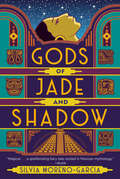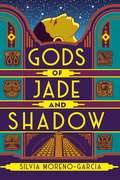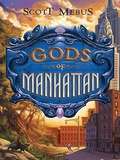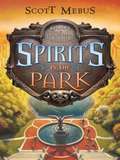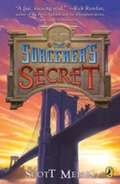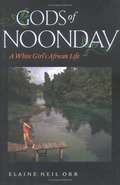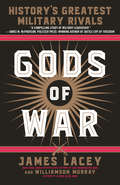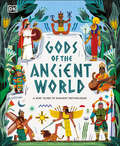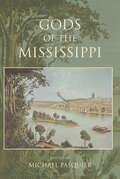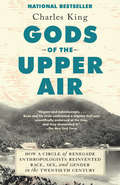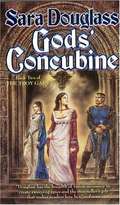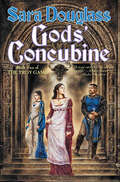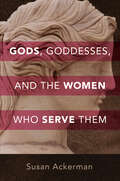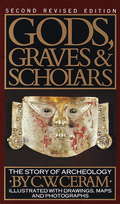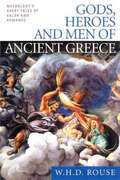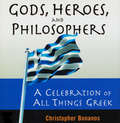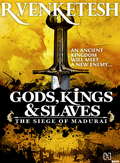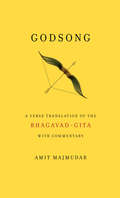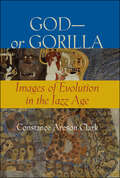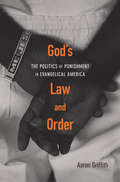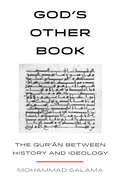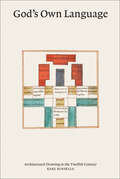- Table View
- List View
Gods of Jade and Shadow: A Novel
by Silvia Moreno-GarciaThe Mayan god of death sends a young woman on a harrowing, life-changing journey in this dark, one-of-a-kind fairy tale inspired by Mexican folklore. “ <P><P> The Jazz Age is in full swing, but Casiopea Tun is too busy cleaning the floors of her wealthy grandfather’s house to listen to any fast tunes. Nevertheless, she dreams of a life far from her dusty small town in southern Mexico. A life she can call her own. <P><P> Yet this new life seems as distant as the stars, until the day she finds a curious wooden box in her grandfather’s room. She opens it—and accidentally frees the spirit of the Mayan god of death, who requests her help in recovering his throne from his treacherous brother. Failure will mean Casiopea’s demise, but success could make her dreams come true. <P><P>In the company of the strangely alluring god and armed with her wits, Casiopea begins an adventure that will take her on a cross-country odyssey from the jungles of Yucatán to the bright lights of Mexico City—and deep into the darkness of the Mayan underworld.
Gods of Jade and Shadow: a perfect blend of fantasy, mythology and historical fiction set in Jazz Age Mexico
by Silvia Moreno-Garcia'This is historical fantasy at its best' S.A. Chakraborty, author of The City of BrassInspired by Mexican folklore, Gods of Jade and Shadow is a magical, wildly imaginative coming-of-age tale for fans of Katherine Arden, Naomi Novik and Helene Wecker.The Jazz Age is in full swing, but Casiopea Tun is too busy scrubbing floors in her wealthy grandfather's house to do more than dream of a life far from her small town in southern Mexico. Until the day she accidentally frees an ancient Mayan god of death, who offers her a deal: in return for Casiopea's help in recovering his throne, he will grant her whatever she desires. From the jungles of Yucatán to the bright lights of Mexico City and deep into the darkness of Xibalba, the Mayan underworld, Casiopea's adventure will take her on a perilous cross-country odyssey beyond anything she's ever known. Success will make her every dream come true, but failure will see her lost, for ever . . .'Wondrous and magical' Kevin Hearne, author of The Iron Druid Chronicles'Evocative and moving' Rebecca Roanhorse, author of Trial of Lightning'An adventure for the mind and the heart' Christina Henry, author of Alice'A joy to read' Genevieve Cogman, author of The Invisible Library seriesA BEST BOOKS OF SUMMER 2019 PICK BY PUBLISHERS WEEKLYONE OF THE HOTTEST BOOKS OF SUMMER BY GOODREADS A SUMMER 2019 B&N DISCOVER GREAT NEW WRITERS SELECTION
Gods of Manhattan
by Scott MebusThirteen-year-old New Yorker Rory Hennessy can see things no one else can. When a magician's trick opens his eyes to Mannahatta, Rory finds an amazing spirit city coexisting alongside modern-day Manhattan. A place where Indian sachems, warrior cockroaches, and papier-mƒch‚ children live, ruled by the immortal Gods of Manhattan - including Babe Ruth, Alexander Hamilton, and Peter Stuyvesant. But Rory's power to see Mannahatta brings danger, and he is pursued by enemies, chasing history and trying to free those who have been enslaved. And when he is given the chance to right Mannahatta's greatest wrong, seeing Mannahatta may not be a gift after all. . . . .
Gods of Manhattan
by Scott MebusThirteen-year-old New Yorker Rory Hennessy can see things no one else can. When a magician's trick opens his eyes to Mannahatta, Rory finds an amazing spirit city coexisting alongside modern-day Manhattan. A place where Indian sachems, warrior cockroaches, and papier-mƒch, children live, ruled by the immortal Gods of Manhattan - including Babe Ruth, Alexander Hamilton, and Peter Stuyvesant. But Rory's power to see Mannahatta brings danger, and he is pursued by enemies, chasing history and trying to free those who have been enslaved. And when he is given the chance to right Mannahatta's greatest wrong, seeing Mannahatta may not be a gift after all. . . .
Gods of Manhattan 2: Spirits in the Park
by Scott MebusRory has known about Mannahatta?the spirit world filled with the ?gods? who ruled New York City in its early days?only a month when an earthquake strikes. This is no ordinary earthquake, though?it is the island?s attempt at breaking the Trap around Central Park. The Trap must open or the balance between Mannahatta and Manhattan will be destroyed?and only Rory can open it. But it will take help from Rory?s newfound friends, including the band of children of the gods?aka the Rattle Watch?and encounters with some of New York?s famous figures, including Washington Irving, Captain Kidd, and Bill the Butcher, to help him figure out how to do that. And the answer may just surprise him. . . .
Gods of Manhattan 3: Sorcerer's Secret
by Scott MebusWar is brewing in Mannahatta - the spirit city that coexists with Manhattan - as the truce between the Munsee Indians and the Gods begins to crack. Villain Willem Kieft is building an army against the Munsees, and Rory - the only person who can see both worlds - and his friends are trying to stop him. But despite their efforts, the city draws closer to the ultimate final battle. The question is, will Rory be able to restore order to the city, or will his attempt to save everyone fail?
Gods of Manhattan 3: Sorcerer's Secret
by Scott MebusWar is brewing in Mannahatta, the spirit city that coexists alongside Manhattan, as the truce between the Munsee Indians and the Gods grows increasingly fragile. Rory?who has the ability to see both worlds?is the City?s last, best hope for survival. In their race to expose power-hungry Willem Kieft?s nefarious plans to incite war, Rory and his friends traverse the boroughs to uncover the secrets of Mannahatta?s past that could finally restore order to the city. With the future of the godly and mortal realms in the balance, New York?s notorious villains and celebrated heroes face off in a heart-stopping battle of epic proportions.
Gods of Manhattan II: Spirits in the Park
by Scott MebusA month has passed since Mannahatta-the spirit city that coexists alongside Manhattan-was revealed to Rory, when an earthquake rocks New York. The island itself is attempting to shake off the Trap around Central Park, and only Rory has the power to open it before even greater catastrophe strikes. But centuries-old wounds must be healed before Rory turns the key. With New York's most notorious figures-including Captain Kidd and Bill the Butcher-at his side and on his trail, Rory discovers that the answer to peace lies with the one man he never wants to see again: his father.
Gods of Noonday: A White Girl's African Life
by Elaine Neil OrrOrr (contemporary literature, women's studies, North Carolina State U.) sensitively depicts growing up in pre-independence Nigeria as the child of American medical missionary parents. Returning to Africa helps restore her health and sense of identity. Annotation ©2004 Book News, Inc., Portland, OR (booknews.com)
Gods of War: History's Greatest Military Rivals
by Williamson Murray James LaceyHannibal vs. Scipio. Grant vs. Lee. Rommel vs. Patton. The greatest battles, commanders, and rivalries of all time come to life in this engrossing guide to the geniuses of military history. &“A compelling study of military leadership.&”—James M. McPherson, Pulitzer Prize–winning author of Battle Cry of Freedom Any meeting of genius may create sparks, but when military geniuses meet, their confrontations play out upon a vast panorama of states or civilizations at war, wielding the full destructive power of a mighty nation&’s armies. Gods of War is the first single-volume, in-depth examination of the most celebrated military rivalries of all time, and of the rare, world-changing battles in which these great commanders in history matched themselves against true equals. From Caesar and Pompey deciding the fate of the Roman Republic, to Grant and Lee battling for a year during the American Civil War, to Rommel and Montgomery and Patton meeting in battle after battle as Hitler strove for European domination, these match-ups and their corresponding strategies are among the most memorable in history. A thrilling look into both the generals&’ lives and their hardest-fought battles, Gods of War is also a thought-provoking analysis of the qualities that make a strong commander and a deep exploration of the historical context in which the contestants were required to wage war, all told with rousing narrative flair. And in a time when technology has made the potential costs of war even greater, it is a masterful look at how military strategy has evolved and what it will take for leaders to guide their nations to peace in the future.
Gods of the Ancient World: A Kids’ Guide to Ancient Mythologies
by Marchella WardUncover the stories of gods and goddesses from around the world, in this dynamic anthology of ancient myths.Discover 23 captivating stories of gods and goddesses from civilizations around the world in this book that introduces children to ancient cultures with colorful illustrations and incredible storytelling. Young readers will delight in myths that explain the beginning of the world, the way gods helped humans, the divine's power over weather and other natural phenomena, and much more. Gods of the Ancient World is a perfect global introduction to the most fascinating stories about gods and goddesses from ancient history. Further featuring: - The incredible myths and legends behind each god or goddess with real-world art references. - Illustrations bring each god and goddess to life for a young audience.- Fact boxes call out key information to draw the reader in.- A global look at mythologies, with Maya, Japanese and Yoruba deities as well as Ancient Greek and Roman gods.Authored by Classics expert Marchella Ward, a researcher at the University of Oxford, this beautifully illustrated treasury of ancient mythologies is perfect for children age 9-12, with amazing real-life photos of ancient objects which show how people worshipped the gods through art.
Gods of the Mississippi
by Michael PasquierFrom the colonial period to the present, the Mississippi River has impacted religious communities from Minnesota to the Gulf of Mexico. Exploring the religious landscape along the 2,530 miles of the largest river system in North America, the essays in Gods of the Mississippi make a compelling case for American religion in motion--not just from east to west, but also from north to south. With discussion of topics such as the religions of the Black Atlantic, religion and empire, antebellum religious movements, the Mormons at Nauvoo, black religion in the delta, Catholicism in the Deep South, and Johnny Cash and religion, this volume contributes to a richer understanding of this diverse, dynamic, and fluid religious world.
Gods of the Upper Air: How a Circle of Renegade Anthropologists Reinvented Race, Sex, and Gender in the Twentieth Century
by Charles KingNEW YORK TIMES BESTSELLER2020 Anisfield-Wolf Book Award WinnerFinalist for the National Book Critics Circle AwardFrom an award-winning historian comes a dazzling history of the birth of cultural anthropology and the adventurous scientists who pioneered it—a sweeping chronicle of discovery and the fascinating origin story of our multicultural world.A century ago, everyone knew that people were fated by their race, sex, and nationality to be more or less intelligent, nurturing, or warlike. But Columbia University professor Franz Boas looked at the data and decided everyone was wrong. Racial categories, he insisted, were biological fictions. Cultures did not come in neat packages labeled "primitive" or "advanced." What counted as a family, a good meal, or even common sense was a product of history and circumstance, not of nature. In Gods of the Upper Air, a masterful narrative history of radical ideas and passionate lives, Charles King shows how these intuitions led to a fundamental reimagining of human diversity. Boas's students were some of the century's most colorful figures and unsung visionaries: Margaret Mead, the outspoken field researcher whose Coming of Age in Samoa is among the most widely read works of social science of all time; Ruth Benedict, the great love of Mead's life, whose research shaped post-Second World War Japan; Ella Deloria, the Dakota Sioux activist who preserved the traditions of Native Americans on the Great Plains; and Zora Neale Hurston, whose studies under Boas fed directly into her now classic novel, Their Eyes Were Watching God. Together, they mapped civilizations from the American South to the South Pacific and from Caribbean islands to Manhattan's city streets, and unearthed an essential fact buried by centuries of prejudice: that humanity is an undivided whole. Their revolutionary findings would go on to inspire the fluid conceptions of identity we know today. Rich in drama, conflict, friendship, and love, Gods of the Upper Air is a brilliant and groundbreaking history of American progress and the opening of the modern mind.
Gods' Concubine (The Troy Game, Book #2)
by Sara DouglassCombines fantasy and history to tell of the last days of Edward the Confessors's reign, the short reign of Harold, his successor and the lives of William and Matilda who will become rulers of Britain in 1066.
Gods' Concubine: Book Two Of The Troy Game (The Troy Game #2)
by Sara DouglassFrom ancient Greece they came, remnants of the glorious Trojans. Led by Brutus, Kingman, holder of the bands of gold that wield the very magic of the Gods, these travelers are bowed but not broken, and they have come to Albion to begin anew. A vision of beauty called them to create a new Troy, and when they landed on the shores of the land that became Britain, they found an old magic that was fading. And so they began to construct a new Labyrinth, a place of magic that will bring unimaginable power to those who can control it.The temptress who brought Brutus to this land seeks to use him for her own purposes, but in that she fails, for it is the bride of Brutus who dooms the completion of the labyrinth . . . and sends all the players in this drama---handsome Brutus, his beautiful wife, Cornelia, and the sensuous and deadly Genvissa---into a hell of death and rebirth, until the Labyrinth is completed and the ancient magic is set free.A thousand years pass. Cathedrals rise in place of mud and wattle huts, hymns to saints replace odes to Celtic and Greek gods. But the magic from the dawn of time waits, and the players are not yet done with their destinies. They have new faces and new bodies, but old souls---and not all who have come back remember their parts in this drama. There are kings and princes, deadly court intrigues, and ancient powers awoken.And a warrior across the sea who only waits for his opportunity to finish what was started centuries before . . .At the Publisher's request, this title is being sold without Digital Rights Management Software (DRM) applied.
Gods, Goddesses, and the Women Who Serve Them
by Susan AckermanA wide-ranging study of women in ancient Israelite religion. Susan Ackerman has spent her scholarly career researching underexamined aspects of the world of the Hebrew Bible—particularly those aspects pertaining to women. In this collection drawn from three decades of her work, she describes in fascinating detail the worship of goddesses in ancient Israel, the roles women played as priests and prophets, the cultic significance of queen mothers, and the Hebrew Bible&’s accounts of women&’s religious lives. Specific topics include:the &“Queen of Heaven,&” a goddess whose worship was the object of censure in the book of JeremiahAsherah, the great Canaanite mother goddess for whom Judean women were described as weaving in the book of Kingsbiblical figures considered as religious functionaries, such as Miriam, Deborah, and Zipporahthe lack of women priests in ancient Israel explored against the prevalence of priestesses in the larger ancient Near Eastern worldthe cultic significance of queen mothers in Israel and throughout the ancient Near EastIsraelite women&’s participation in the cult of Yahweh and in the cults of various goddesses
Gods, Graves & Scholars: The Story of Archaeology
by C. W. CeramC.W. Ceram visualized archeology as a wonderful combination of high adventure, romance, history and scholarship, and this book, a chronicle of man's search for his past, reads like a dramatic narrative. We travel with Heinrich Schliemann as, defying the ridicule of the learned world, he actually unearths the remains of the ancient city of Troy. We share the excitement of Lord Carnarvon and Howard Carter as they first glimpse the riches of Tutankhamen's tomb, of George Smith when he found the ancient clay tablets that contained the records of the Biblical Flood. We rediscover the ruined splendors of the Hanging Gardens of Babylon, one of the wonders of the ancient wold; of Chichen Itza, the abandoned pyramids of the Maya: and the legendary Labyrinth of tile Minotaur in Crete. Here is much of the history of civilization and the stories of the men who rediscovered it.From the Paperback edition.
Gods, Heroes and Men of Ancient Greece: Mythology's Great Tales of Valor and Romance
by W. H. D. RouseThe Adventures that Shaped the Western World First published in 1934, Gods, Heroes and Men of Ancient Greece has become one of the most popular, enduring--and captivating--retellings of the ancient myths for modern readers. Recognizing the sheer entertainment value of these timeless adventures, world renowned classical scholar W. H. D. Rouse delighted his students at the Perse School in Cambridge, England, with a conversational style and childlike wonder that made the legends come alive--a rare storytelling gift that continues to engage young and old alike. Many of the characters in this book are familiar to us--Helen of Troy, Icarus, Zeus, Athena, to name just a few--but rarely have their stories of war and adventure, bravery and romance, been so simply and thrillingly told. From the strong-arm heroics of Heracles, to the trickery of the Trojan Horse, from the seductions of Circe the sorceress, to the terrors of the Cyclops and Minotaur, these legends have outlived the culture that bore them. But while the ancient Greeks may be long gone, their fables and morals, their heroes and heroines, live on today hellip;
Gods, Heroes, And Philosophers: A Celebration Of All Things Greek
by Christopher BonanosHere are some of the reasons to be proud to be Greek:* Alexander the Greet, greatest conqueror of them all* Olympic games, past and present* Olympia Dukakis, George Stephanopolous, and Yanni * Birth of democracy, cradle of western civilization* Aesop's wise and winning fables* Warm souvlaki, cold retsina* And every Greek diner you ever ate in!
Gods, Kings & Slaves: The Siege of Madurai
by Venketesh R.War is coming... Peninsular India, fourteenth century. The Pandyan empire is at its peak, its enemies subdued and its people at peace. Having left behind his step-brother Sundar in the race to the throne, Crown Prince Veera Pandyan is set to rule from Madurai, reputed to be the richest city in the subcontinent. But invisible fractures within the kingdom threaten to destroy it, and a new enemy approaches, swifter than anyone can imagine. In Delhi, Sultan Alauddin Khilji?s trusted general, the eunuch Malik Kafur, has trained his eyes on the distant south, fabled for its riches. A slave captured by the Khiljis, Kafur is renowned for his ambition and cunning. None, not even the mighty Mongols, have defeated him ? no empire can withstand the trail of destruction he leaves in his wake. And all he wants is to see Madurai on its knees, its wealth pillaged, its temples destroyed. As an ancient city combusts in flames of treachery, bloodlust and revenge, brother will battle brother, ambition will triumph over love, slaves will rise to rule, cities will be razed to dust, and the victor will be immortalized in history...'
Godsong: A Verse Translation of the Bhagavad-Gita, with Commentary
by Amit MajmudarA fresh, strikingly immediate and elegant verse translation of the classic, with an introduction and helpful guides to each section, by the rising American poet.Born in the United States into a secularized Hindu family, Amit Majmudar puzzled over the many religious traditions on offer, and found that the Bhagavad Gita had much to teach him with its "song of multiplicities." Chief among them is that "its own assertions aren't as important as the relationships between its characters . . . The Gita imagined a relationship in which the soul and God are equals"; it is, he believes, "the greatest poem of friendship . . . in any language." His verse translation captures the many tones and strategies Krishna uses with Arjuna--strict and berating, detached and philosophical, tender and personable. "Listening guides" to each section follow the main text, and expand in accessible terms on the text and what is happening between the lines. Godsong is an instant classic in the field, from a poet of skill, fine intellect, and--perhaps most important--devotion.
God—or Gorilla: Images of Evolution in the Jazz Age (Medicine, Science, and Religion in Historical Context)
by Constance A. ClarkAs scholars debate the most appropriate way to teach evolutionary theory, Constance Areson Clark provides an intriguing reflection on similar debates in the not-too-distant past. Set against the backdrop of the Jazz Age, God—or Gorilla explores the efforts of biologists to explain evolution to a confused and conflicted public during the 1920s. Focusing on the use of images and popularization, Clark shows how scientists and anti-evolutionists deployed schematics, cartoons, photographs, sculptures, and paintings to win the battle for public acceptance. She uses representative illustrations and popular media accounts of the struggle to reveal how concepts of evolutionary theory changed as they were presented to, and absorbed into, popular culture.Engagingly written and deftly argued, God—or Gorilla offers original insights into the role of images in communicating—and miscommunicating—scientific ideas to the lay public.
God’s Law and Order: The Politics Of Punishment In Evangelical America
by Aaron GriffithAn incisive look at how evangelical Christians shaped—and were shaped by—the American criminal justice system.America incarcerates on a massive scale. Despite recent reforms, the United States locks up large numbers of people—disproportionately poor and nonwhite—for long periods and offers little opportunity for restoration. Aaron Griffith reveals a key component in the origins of American mass incarceration: evangelical Christianity.Evangelicals in the postwar era made crime concern a major religious issue and found new platforms for shaping public life through punitive politics. Religious leaders like Billy Graham and David Wilkerson mobilized fears of lawbreaking and concern for offenders to sharpen appeals for Christian conversion, setting the stage for evangelicals who began advocating tough-on-crime politics in the 1960s. Building on religious campaigns for public safety earlier in the twentieth century, some preachers and politicians pushed for “law and order,” urging support for harsh sentences and expanded policing. Other evangelicals saw crime as a missionary opportunity, launching innovative ministries that reshaped the practice of religion in prisons. From the 1980s on, evangelicals were instrumental in popularizing criminal justice reform, making it a central cause in the compassionate conservative movement. At every stage in their work, evangelicals framed their efforts as colorblind, which only masked racial inequality in incarceration and delayed real change.Today evangelicals play an ambiguous role in reform, pressing for reduced imprisonment while backing law-and-order politicians. God’s Law and Order shows that we cannot understand the criminal justice system without accounting for evangelicalism’s impact on its historical development.
God’s Other Book: The Qur’an between History and Ideology
by Mohammad SalamaA free ebook version of this title is available through Luminos, University of California Press’s Open Access publishing program. Visit www.luminosoa.org to learn more. In God’s Other Book, Mohammad Salama presents a powerful critique of the ways we study and analyze early Islam and its sacred text, filling a glaring hole in our understanding of this formative environment. Interrogating the ideological framework of late antiquity, Salama exposes hidden assumptions that prevent scholars from truly placing Islam in its sociohistorical and cultural milieu. He offers an alternative theoretical and practical model focused on pre-Islamic Arabic cultural production. Foregrounding the indigenous Arab community of seventh-century Hijaz, Salama demonstrates how the Qurʼān played an organic role in commenting on, interacting with, and taking sides concerning matters of ethnicity, ethics, dress codes, and social habits. Only with renewed attention to the Qurʼān itself can Western readers engage ethically with Islamic studies and with the cultures and traditions of those who live according to another book.
God’s Own Language: Architectural Drawing in the Twelfth Century
by Karl KinsellaHow modern architectural language was invented to communicate with the divine—challenging a common narrative of European architectural history.The architectural drawing might seem to be a quintessentially modern form, and indeed many histories of the genre begin in the early modern period with Italian Renaissance architects such as Alberti. Yet the Middle Ages also had a remarkably sophisticated way of drawing and writing about architecture. God&’s Own Language takes us to twelfth-century Paris, where a Scottish monk named Richard of Saint Victor, along with his mentor Hugh, developed an innovative visual and textual architectural language. In the process, he devised techniques and terms that we still use today, from sectional elevations to the word &“plan.&”Surprisingly, however, Richard&’s detailed drawings appeared not in an architectural treatise but in a widely circulated set of biblical commentaries. Seeing architecture as a way of communicating with the divine, Richard drew plans and elevations for such biblical constructions as Noah&’s ark and the temple envisioned by the prophet Ezekiel. Interpreting Richard and Hugh&’s drawings and writings within the context of the thriving theological and intellectual cultures of medieval Paris, Karl Kinsella argues that the popularity of these works suggests that, centuries before the Renaissance, there was a large circle of readers with a highly developed understanding of geometry and the visual language of architecture.
